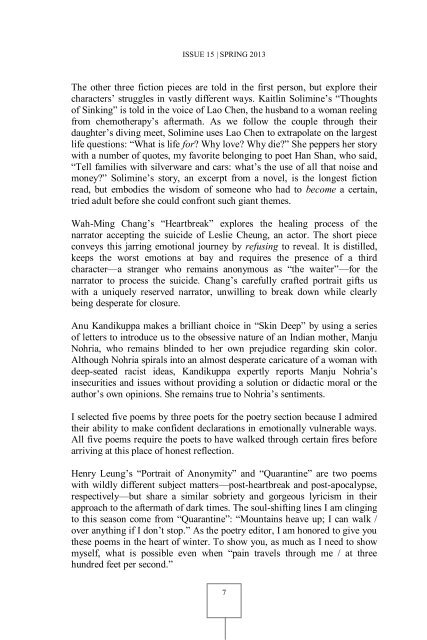Create successful ePaper yourself
Turn your PDF publications into a flip-book with our unique Google optimized e-Paper software.
ISSUE 15 | SPRING 2013<br />
The other three fiction pieces are told in the first person, but explore their<br />
characters’ struggles in vastly different ways. Kaitlin Solimine’s “Thoughts<br />
of Sinking” is told in the voice of Lao Chen, the husband to a woman reeling<br />
from chemotherapy’s aftermath. As we follow the couple through their<br />
daughter’s diving meet, Solimine uses Lao Chen to extrapolate on the largest<br />
life questions: “What is life for? Why love? Why die?” She peppers her story<br />
with a number of quotes, my favorite belonging to poet Han Shan, who said,<br />
“Tell families with silverware and cars: what’s the use of all that noise and<br />
money?” Solimine’s story, an excerpt from a novel, is the longest fiction<br />
read, but embodies the wisdom of someone who had to become a certain,<br />
tried adult before she could confront such giant themes.<br />
Wah-Ming Chang’s “Heartbreak” explores the healing process of the<br />
narrator accepting the suicide of Leslie Cheung, an actor. The short piece<br />
conveys this jarring emotional journey by refusing to reveal. It is distilled,<br />
keeps the worst emotions at bay and requires the presence of a third<br />
character—a stranger who remains anonymous as “the waiter”—for the<br />
narrator to process the suicide. Chang’s carefully crafted portrait gifts us<br />
with a uniquely reserved narrator, unwilling to break down while clearly<br />
being desperate for closure.<br />
Anu Kandikuppa makes a brilliant choice in “Skin Deep” by using a series<br />
of letters to introduce us to the obsessive nature of an Indian mother, Manju<br />
Nohria, who remains blinded to her own prejudice regarding skin color.<br />
Although Nohria spirals into an almost desperate caricature of a woman with<br />
deep-seated racist ideas, Kandikuppa expertly reports Manju Nohria’s<br />
insecurities and issues without providing a solution or didactic moral or the<br />
author’s own opinions. She remains true to Nohria’s sentiments.<br />
I selected five poems by three poets for the poetry section because I admired<br />
their ability to make confident declarations in emotionally vulnerable ways.<br />
All five poems require the poets to have walked through certain fires before<br />
arriving at this place of honest reflection.<br />
Henry Leung’s “Portrait of Anonymity” and “Quarantine” are two poems<br />
with wildly different subject matters—post-heartbreak and post-apocalypse,<br />
respectively—but share a similar sobriety and gorgeous lyricism in their<br />
approach to the aftermath of dark times. The soul-shifting lines I am clinging<br />
to this season come from “Quarantine”: “Mountains heave up; I can walk /<br />
over anything if I don’t stop.” As the poetry editor, I am honored to give you<br />
these poems in the heart of winter. To show you, as much as I need to show<br />
myself, what is possible even when “pain travels through me / at three<br />
hundred feet per second.”<br />
7


